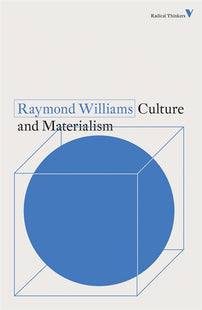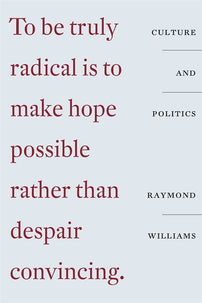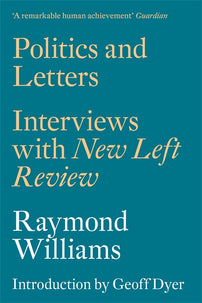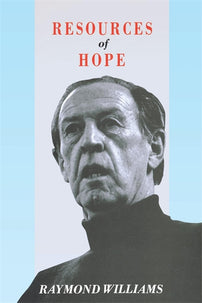Raymond Williams: When Was Modernism?
Here, published for the first time, is an extract from the renowned socialist cultural theorist Raymond Williams's famous ‘When Was Modernism?’ lecture, delivered at the University of Bristol in March 1987, and taken from the newly published Culture and Politics: Class, Writing, Socialism – the first Williams book for more than three decades to include new material.

On the centenary of Raymond Williams’s birth, we’re delighted to publish an exclusive extract from his renowned lecture ‘When Was Modernism?’, delivered as the Lewis Fry Memorial Lecture at the University of Bristol in March 1987. It’s a hugely influential essay but until now has only been available in ‘reconstructed’ form. That version, roughly a third of the length of the original lecture, was made by Fred Inglis from his own notes and those of Williams. It was published in 1989 in New Left Review and the posthumous collection Politics of Modernism. Phil O’Brien, of the Raymond Williams Society, recently discovered an unknown recording of the lecture which will be published in the forthcoming Culture and Politics: Class, Writing, Socialism – the first Williams book for more than three decades to include ‘new’ material.
Modern, in its root sense, means ‘just now’. But since the time some 500 years ago when groups of people began defining themselves as moderns in comparison and contrast with the ancients and, indeed, invented the middle ages to create a proper distance between them, modern has also taken on a historical dimension. That is to say that at any time, modern in the last 500 years has been ‘just now’ but has also been this constantly extending period after some date which usually settles around the Renaissance. Since that time certain words derived from it – ‘modernist’ itself, ‘modernism’, ‘modernize’ – have been regularly used on the whole until the nineteenth century relatively unfavourably; as ‘a state of alteration, perhaps of improvement’, as Jane Austen was to put it in one novel. There was a sense that something was being brought up to date but whether this was anything better was always a question. It wasn’t until the nineteenth century when it began to acquire, in the wake of the industrial revolution, much more positive uses. From then on there are certain decades where the description modern or new seems almost obligatory for certain groups of a cultural kind making their way.
The 1840s is such a period, when John Ruskin publishes Modern Painters, meaning principally J. M. W. Turner. The 1890s is also such a period, when the number of periodicals founded with modern or new in the title is remarkable. The 1930s was another period of that kind. The 1960s again. The problem is that these moderns, these versions of the modern, continually recede into history and there is a tension between the sense which is offered to be conveyed by these self-descriptions of ‘just now’ – immediacy, up-to-date, very often the reformed, innovating, the experimental – and the steadily accumulating period which in this and other contexts are defined as modern. ‘Contemporary’ sometimes rivals it but contemporary can mean ‘just then’; you can have contemporaries of William Shakespeare or contemporaries of William the Bastard who are not necessarily modern. So contemporary as an indication of ‘just now’ is always subject to that difficulty. Now my question ‘When Was Modernism?’ is an adaptation of a title of a book by my friend, professor Gwyn Williams of the University of Wales, When Was Wales? (1985). That was a historical question addressed to a very real, very strong but necessarily problematic identity. It was there, when did it happen, how did it happen? My question has a similar spirit but it’s going to be centred on one very particular fact: that, from a comparatively recent date, a whole area of work in the arts was confidently described as modernist and, in product, as modernism. It was described to the point where you have the very curious linguistic situation that what has followed that work has to be called postmodern. So that a post- ‘just now’ situation, which has been operative for the last twenty years, is a linguistic curiosity at least but it is also I think historically very instructive.
Modern got settled in a description of certain innovations in literature, painting, music, and drama as having begun somewhere around 1890 and – then the arguments about dates begin – ending somewhere around 1940, 1950. But what is so curious is that this modern has gone on being modern even if on some accounts it has been over for half a century. It is this curious phenomenon that I want to explore. It is like that other related phrase, avant-garde, which is a very important component of modernism but I think, as I will try to argue, quite distinct from it. The avant-garde is originally a military metaphor for the vanguard outriding the main force, through to a political metaphor from the 1830s of the vanguard of social progress and development, and then into a specialization of artistic movements from, I suppose, the 1890s but very confidently from 1910. And the point that has to be made about the avant-garde which still makes it a distinguishable definition from modernism is that the avant-garde was never a cultural movement alone. I think that in recent usage this point has been forgotten, in fact for interesting social reasons. The avant-garde, typically the futurists or the surrealists, always proposed new methods in the arts but they also proposed them as means to or consequent upon very radical changes in society or, to be even more ambitious, in human nature, the apprehension of life itself. The avant-garde really was something that was going to change the nature of life. And the fact that those movements have not been so common since, say, 1945 is a distinct historical development – something is lost I think if we go on calling avant-garde what is merely an experimental method in one of the arts. This will be one of the problems I shall keep raising and returning to. Avant-garde means more than experimental. Avant-garde really meant, as a metaphor from which it was derived, the notion of a general direction of change of which certain changes in the arts were the outriders, the heralds, the witnesses. Modern might have been like that but if, for example, you’d gone up to some highly educated gentleman in 1900 and said ‘sir, can you tell me what you understand by modernism?’, he’d have said, ‘well it refers to a well-known theological tendency in the Catholic church where a particular group are trying to redefine the relations between dogma and the new science’. Modernism in fact in these specific senses – meaning some actual body of work and ideas as distinct from earlier seventeenth-, eighteenth-, and nineteenth-century senses where it simply meant bringing something up-to-date, a new style – begins in English and, I think more generally, in Europe as a theological concept. I am not sure, I don’t think anyone can yet be sure because the amount of material to be searched is immense, when it really becomes specialized in courses and studies of literature, drama, painting, to particular methods which new artists are using. Certainly it is not common, this I can say with confidence, before the 1950s, and its place of origin in that immensely influential use is as you might expect New York.
In fact, the announcement in New York that what had been significant in the arts and culture of the previous fifty years was properly understood as modernism was an announcement which beat by only a few years the consequent announcement that it had ended and we are now in the epoch of postmodernism. As we shall see, the people who were making innovations in these different arts were very conscious that they were making something new, and they might occasionally use the word modern in relation to their work, but they did not see themselves as modernists or part of modernism. The sense that has been given is largely retrospective and this has importance because in that retrospective generalization ideological points have been made but made surreptitiously, not declared as values and arguments but offered as a kind of history which carries certain inevitable conclusions. To those people above all one must address the question: ‘When Was Modernism?’ Is it for example in the novel, those radical innovations which one can identify with the names of Nikolai Gogol or Gustave Flaubert or Charles Dickens, which would have us around the middle of the nineteenth century? Or is it those innovations which one associates with the names of say Marcel Proust, James Joyce, and Franz Kafka? I know what the New York generalization of the 1950s tells us – Proust, Joyce, Kafka – but that is the sort of unresolved point which we will be exploring. In painting, is the new, radical break the impressionists for example? Which would take us back in certain ways to John Constable, who was seen in the 1830s as painting in certain radical new ways which offended contemporary sensibility. Or is it to be dated precisely at post-impressionism, the move away from representation, cubism, and so on? In verse, is it to be dated to the symbolists of the 1870s or 1880s? Or is it to be dated to those many schools of poets, futurists, constructivists, and imagists who precisely rejected symbolism as an outdated form? Symbolism itself had been seen as a radical break, remember. In drama, is it the extraordinary innovation of Henrik Ibsen, or the equally extraordinary but different innovation of August Strindberg? They were seen in their time as carriers of the new. Ibsen was so regarded as the carrier of the new that even the newly fashionable cigarette got a brand named after him; Strindberg was regarded as the archetypal radical, careless, anti-traditional dramatist. Is it to be dated from them, those who describe themselves as naturalists, at least until the turn of the century? Or is it to be dated from what is now called the revolt against naturalism which can be reduced with a certain simplification to the period of the expressionists and a certain centring on the name of Bertolt Brecht? These are not questions designed only to raise difficulties but they go to the heart of this particular definition of modernism which has become cultural orthodoxy.
Culture and Politics: Class, Writing, Socialism by Raymond Williams, edited by Phil O’Brien, is now available to pre-order. It will be published in January 2022.
[book-strip index="1" style="display"]



